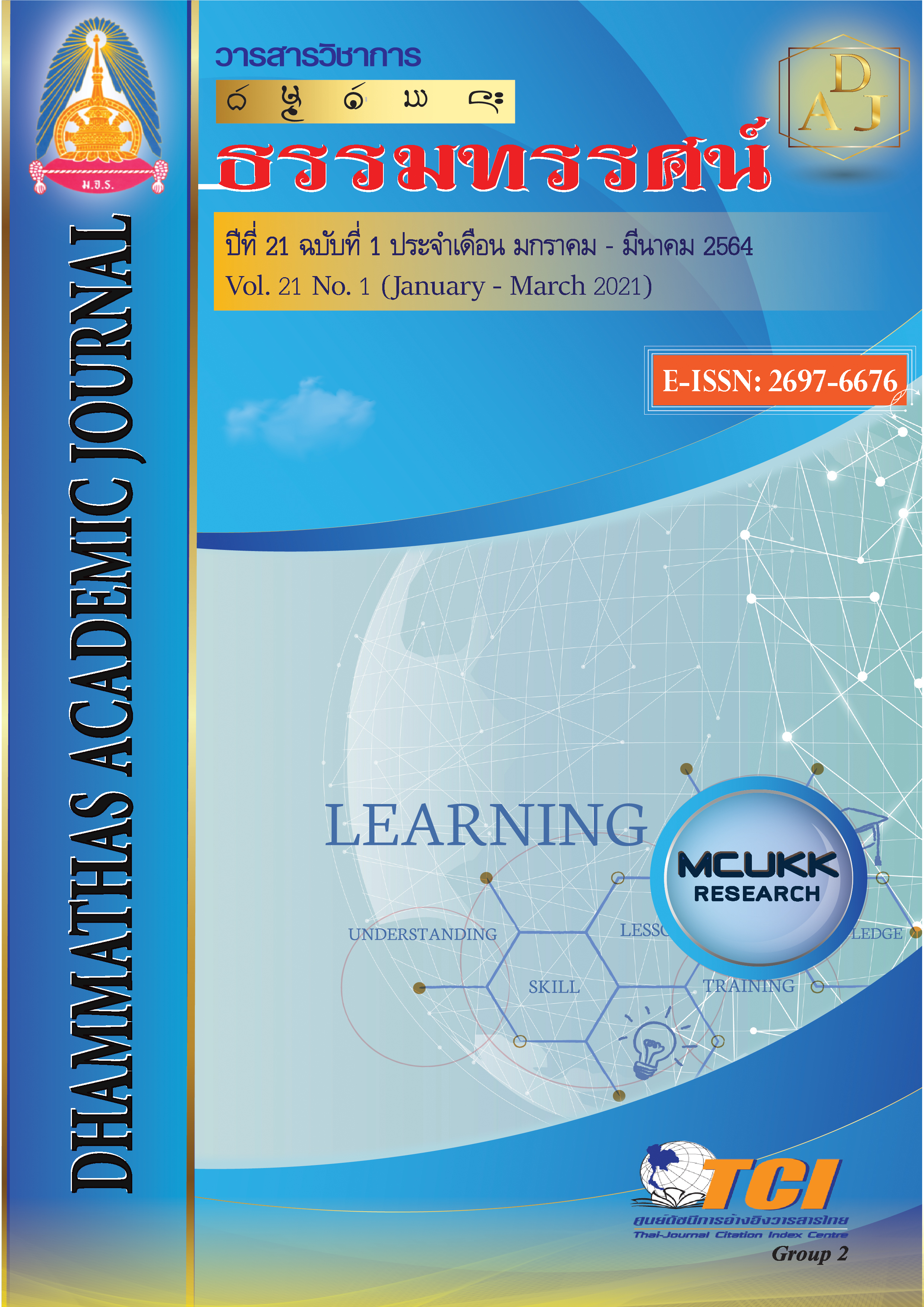The Effective of Buddhist Administration of Agricultural Community Learning Center
Main Article Content
Abstract
The purpose of this research are: 1) to study the administration of agricultural community learning center which is a best practice, 2) to study the factors affecting the effective of Buddhist administration of agricultural community learning center by using qualitative research methods. Data were collected through in-depth interviews. Experts in managing successful agricultural community learning centers. And experts in Buddhist administration. Data analysis to integrate the principles with the administration of the agricultural community learning center.
The research result finds that: Effectiveness of Buddhist methods of managing a good practice agricultural community learning center to be able to achieve the goals that are set requires three key factors: participatory management. Success factor and Dharma for practice. the factors affecting the Effective of Buddhist administration of agricultural community learning center consisting of; 1) participative administration including participate in thinking, participate in decision making, participate in planning, participation in action, participation in monitoring and evaluation and participation in receiving benefits, 2) success factors are knowledge, skill/ ability, technology/ innovation, master farmer, budget and marketing, 3) Dhamma for practice, such as Iddhipàda 4 consists of aspiration (Chanda), effort (Viriya), thoughtfulness (Citta), investigation (Vãmamsà), and 4) the effective of Buddhist method administration of agricultural community learning center consists of non-stop development, team up to build networks, the existence is not compromised and acceptable in society.
Article Details
References
กระทรวงเกษตรและสหกรณ์. (2559). แผนพัฒนาการเกษตรในช่วงแผนพัฒนาเศรษฐกิจและสังคมแห่งชาติ ฉบับที่ 12 (พ.ศ. 2560-2564). กรุงเทพฯ: กระทรวงเกษตรและสหกรณ์.
จิณณวัตร ปะโคทัง. (2549). รูปแบบการมีส่วนร่วมของชุมชนในการจัดการศึกษา ขั้นพื้นฐานของโรงเรียนดีเด่น โรงเรียนกันทรารมณ์ จังหวัดศรีสะเกษ. (วิทยานิพนธ์การศึกษาดุษฎีบัณฑิต). ชลบุรี: มหาวิทยาลัยบูรพา.
ธวัชชัย เสือเมือง และยุภาพรรณ มันกระโทก. (2561). การถอดบทเรียนกระบวนการพัฒนากลุ่มเกษตรอินทรีย์ชุมชนบ้านเขาดิน อำเภอคลองหาด จังหวัดสระแก้ว. วารสารเภสัชกรรมไทย, 10(1), 49-59.
นิสิต คำหล้า, อนันต์ พลธานี และอรุณี พรมคำบุตร. (2557). บทบาทของการพัฒนาศูนย์เรียนรู้เศรษฐกิจพอเพียงในชุมชน: กรณีศึกษา อำเภอชุมแพ จังหวัดขอนแก่น. วารสารแก่นเกษตร, 42(2), 258-264.
ประจวบ หนูเลี่ยง, เด่น ชะเนติยัง และนวลพรรณ วรรณสุธี. (2559). การพัฒนารูปแบบการจัดการศึกษาแบบมีส่วนร่วมของจังหวัดพัทลุง. วารสารปาริชาต มหาวิทยาลัยทักษิณ, 28(2), 232-253.
ปัญญา จันทโคต และกุลธิดา ท้วมสุข. (2558). ปัจจัยที่สนับสนุนความสำเร็จในการดำเนินงานของศูนย์เรียนรู้ชุมชนในประเทศไทย. วารสารวิจัย สมาคมห้องสมุดแห่งประเทศไทย, 8(1), 42-52.
ไพฑูรย์ สนธิเมือง. (2550). ยุทธศาสตร์การมีส่วนร่วมจัดการศึกษากับการพัฒนา สถานศึกษา: กรณีศึกษา องค์การบริหารส่วนตำบลแห่งหนึ่งในจังหวัดภาคใต้. (วิทยานิพนธ์ครุศาสตรมหาบัณฑิต). ภูเก็ต: มหาวิทยาลัยราชภัฎภูเก็ต.
รุจิรา ทนงกิจ, จำลอง โพธิ์บุญ และวิสาขา ภู่จินดา. (2560). การประเมินประสิทธิผลศูนย์เรียนรู้พลังงานชุมชน. วารสารการวิจัยเพื่อพัฒนาชุมชน (มนุษยศาสตร์และสังคมศาสตร์), 10(4), 163-174.
ศรีประไพ อุดมละมุด, ซูลฟีกอร์ มาโซ, สมบัติ โยธาทิพย์, อานนท์ มุสิกวัณณ์ และแวมามุ แวหะมะ. (2560). ความสำเร็จในการดำเนินงานของศูนย์เรียนรู้ชุมชน: กรณีศึกษาศูนย์เรียนรู้เศรษฐกิจพอเพียง ตำบลยุโป อำเภอเมืองยะลา จังหวัดยะลา (รายงานการวิจัย). ยะลา: มหาวิทยาลัยราชภัฏยะลา
สำนักข่าวอิสรา. (2561). นโยบายศูนย์เรียนรู้เกษตร คสช.ส่อเหลว สตง.พบปัญหา. เข้าถึงได้จาก https://www.isranews.org/isranews-news/63458-news00_63458.html
สุภัทรชัย สีสะใบ. (2561). พุทธวิธีการบริหารจัดการศูนย์เรียนรู้ชุมชนการเกษตร. วารสารสหวิทยาการมนุษยศาสตร์และสังคมศาสตร์, 1(2), 1-12.
สุวุฒิ วรวิทย์พินิต. (2560). การพัฒนารูปแบบการจัดการศูนย์การเรียนรู้วิถีเมืองเพชร ตามแนวทางปรัชญาของเศรษฐกิจพอเพียง. วารสาร Veridian E-Journal ฉบับภาษาไทย สาขามนุษยศาสตร์ สังคมศาสตร์ และศิลปะ มหาวิทยาลัยศิลปากร, 10(2), 1657-1674.

